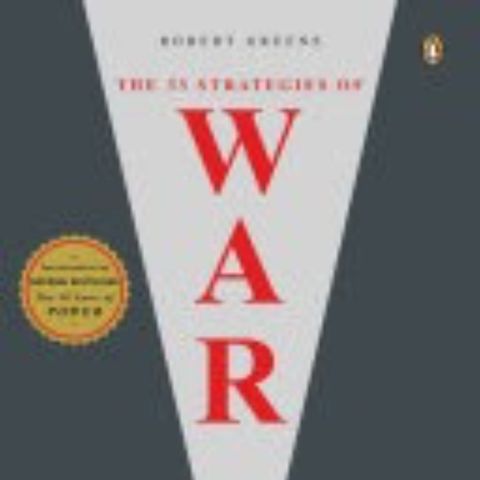Mastering Conflict: Strategic Insights from Robert Greene's 'The 33 Strategies of War'

Download and listen anywhere
Download your favorite episodes and enjoy them, wherever you are! Sign up or log in now to access offline listening.
Description
Chapter 1:Summary of The 33 Strategies of War "The 33 Strategies of War" by Robert Greene is a guide that blends historical examples with practical advice on conflict and competition....
show more"The 33 Strategies of War" by Robert Greene is a guide that blends historical examples with practical advice on conflict and competition. The book is organized into five main sections, each containing various strategies that draw from military history and philosophies. Here’s a summary of its key themes and strategies:
- Self-Directed Warfare: This section emphasizes the importance of self-mastery and self-awareness in understanding one's strengths and weaknesses. It discusses strategies for maintaining focus, managing emotions, and staying adaptable to changing circumstances.
- Organizational (Team) Warfare: This part highlights the significance of teamwork and solid organizational strategy. Greene suggests forming cohesive groups, managing relationships within teams, and utilizing the strengths of each individual to achieve common goals.
- Defensive Warfare: Here, the focus shifts to protective strategies. Greene explores how to create defenses against attacks, both in direct confrontation and in competitive environments. He emphasizes the importance of strategic withdrawal and maintaining a strong position.
- Offensive Warfare: This section outlines various strategies for offense, including how to seize opportunities, outmaneuver opponents, and take decisive action. Greene encourages the reader to be proactive and to use deception and indirect tactics to outsmart rivals.
- Unpredictable Warfare: Lastly, Greene addresses the element of unpredictability in conflict. He advises on how to keep opponents guessing and maintain a strategic advantage through surprise and unconventional tactics.Throughout the book, Greene employs historical anecdotes and examples from military leaders, strategists, and cultural icons, offering readers actionable advice that can be applied beyond the battlefield to personal and professional scenarios. The overarching theme is the idea that understanding and mastering the art of strategy is crucial for success in any competitive environment.
Chapter 2:The Core Themes of The 33 Strategies of War
"The 33 Strategies of War" by Robert Greene explores several core themes centered around the concepts of strategy, conflict, and psychological maneuvering. One of the central themes is the idea of understanding and navigating the complexities of human behavior and relationships, particularly in competitive environments. Greene emphasizes the importance of adaptability and the capacity to outthink opponents rather than relying solely on brute force.Another key theme is the concept of self-discipline and the necessity of maintaining a clear perspective in chaotic situations. Greene advocates for the strategic use of deception, misdirection, and surprise, drawing parallels between military strategy and everyday life challenges. The book also delves into the significance of leadership and the qualities that make effective leaders, such as decisiveness, charisma, and the ability to inspire loyalty.Additionally, Greene discusses the ethical dimensions of strategy, interrogating the balance between ruthless tactics and honorable behavior. Throughout, he underscores the importance of preparation, the value of patience, and the need to anticipate and control the environment to achieve one's objectives. Ultimately, the book serves as a guide for understanding the art of conflict and the psychological principles that govern successful interactions in both personal and professional spheres.
Chapter 3: 10 Quotes From The 33 Strategies of War
Certainly! Here are ten notable quotes from "The 33 Strategies of War" by Robert Greene:
- "The greatest victory is that which requires no battle."
- "In the midst of chaos, there is also opportunity."
- "Know your enemy and know yourself and you can fight a hundred battles without disaster."
- "You must be extremely subtle, even to the point of formlessness."
- "The best way to get rid of the enemy is to make him your friend."
- "Be extremely careful when entering a battle you are destined to win."
- "Your strategy must take into account the psychological dimension of warfare."
- "Victory is not always a matter of strength. It is a matter of timing."
- "When you are strong, appear weak."
- "Avoid the snares of overconfidence."These quotes reflect Greene's emphasis on strategy, psychological insight, and the nuances of conflict and competition. If you have any particular area of interest in the book, feel free to ask!
Book https://www.bookey.app/book/the-33-strategies-of-war
Author https://www.bookey.app/quote-author/robert-greene
Quotes https://www.bookey.app/book/the-33-strategies-of-war/quote
The Art of War https://www.bookey.app/book/the-art-of-war
Youtube https://www.youtube.com/watch?v=wu5soeP52no
Amazon https://www.amazon.com/Strategies-War-Joost-Elffers-Books/dp/0143112783
Goodreads https://www.goodreads.com/book/show/35289.The_33_Strategies_of_War
Information
| Author | Bookey |
| Organization | pancheng li |
| Website | - |
| Tags |
Copyright 2024 - Spreaker Inc. an iHeartMedia Company

Comments